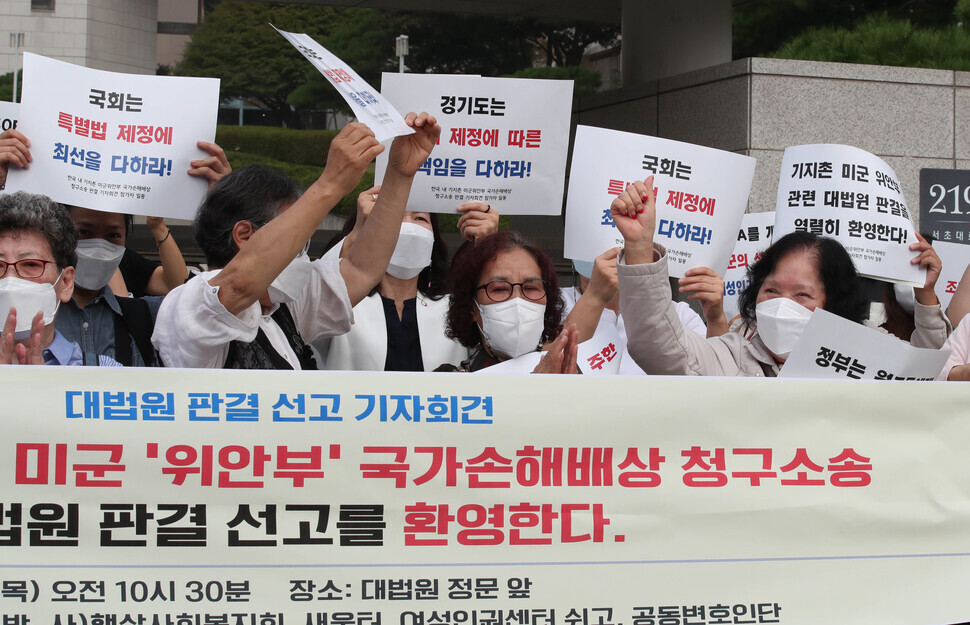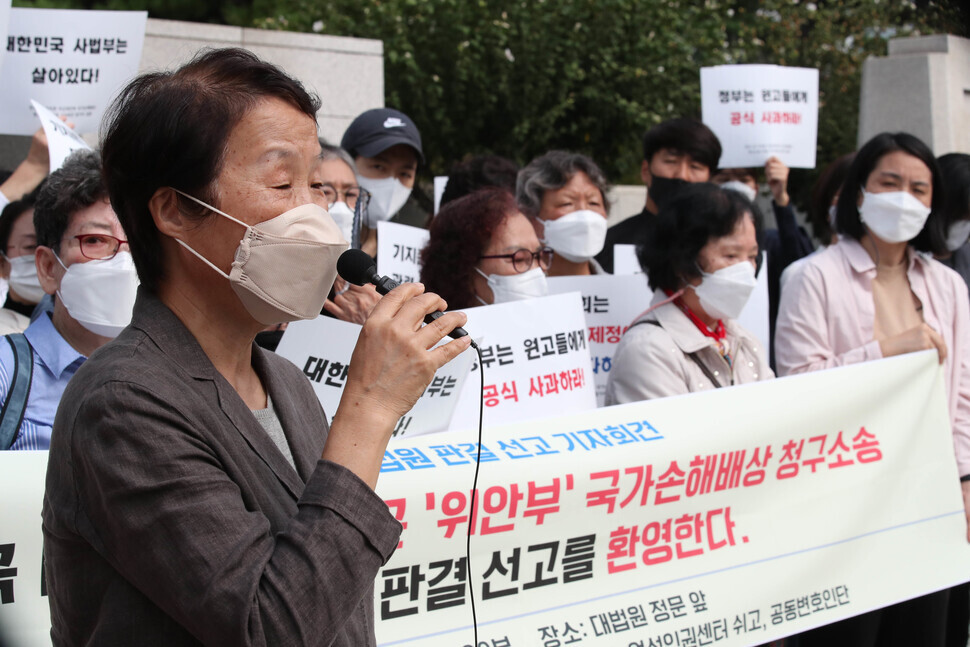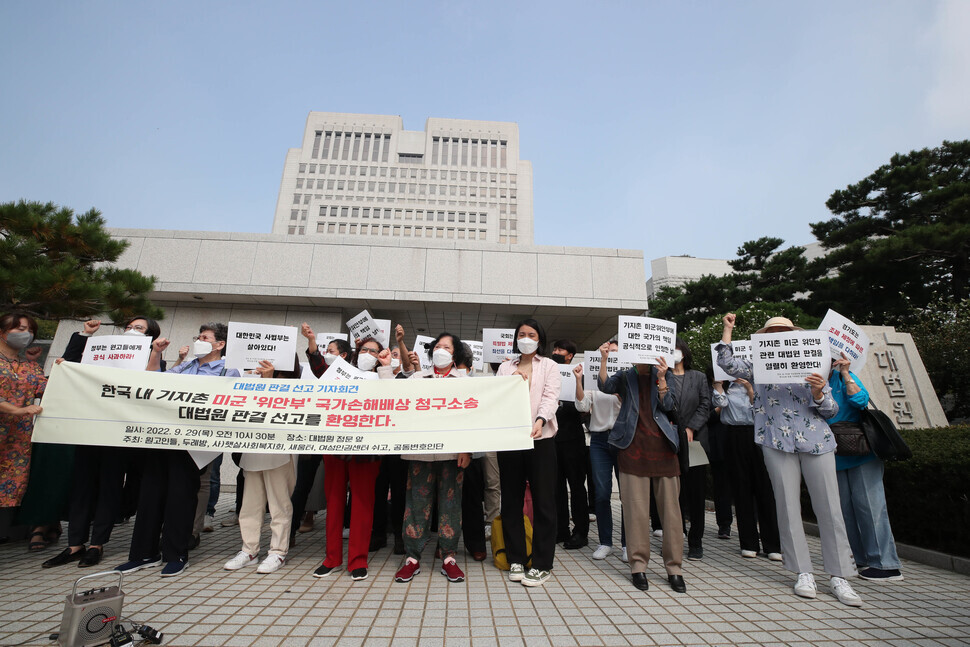hankyoreh
Links to other country sites 다른 나라 사이트 링크
S. Korean Supreme Court rules state must compensate camptown women who worked near US bases

The South Korean judicial system has concluded that the state actively encouraged and justified prostitution for the US military while managing “camptowns” (commercial areas near US Army bases) during the country’s authoritarian era.
On Thursday, the second panel of the Supreme Court, under Justice Lee Dong-won, uphold a decision by a lower court that found partly in favor of 95 former women who worked in brothels at US military camptowns who had sued the Korean state, demanding the government to pay them each 10 million won in damages.
During the presidency of Syngman Rhee, the Korean government essentially coordinated prostitution by designating recreational facilities around US military bases and testing sex workers for sexually transmitted diseases two times a week.
The government forced the women to register as prostitutes for the US military and submit to STD testing and mobilized public health workers and the police to forcibly quarantine those who refused to be tested. The women were also given “patriotism classes,” in which they were praised as “patriots earning foreign currency.”
The former camptown women sued the government in 2014 for promoting prostitution for the US military, which they say kept them locked into the camptown sex trade for an extended period, resulting in physical and psychological suffering.
The government countered that it wasn’t obligated to pay damages because the statute of limitations for claiming damages (set at five years for damages resulting from illegal actions) had expired.

In 2017, a district court ruled that the government was only liable for compensating 57 of the plaintiffs. Those were the camptown women who had been quarantined prior to 1977, when an enforcement rule about quarantining people infected with STDs was added to the Infectious Disease Control and Prevention Act.
But the following year, an appeals court greatly broadened the state’s liability by ordering the government to pay 3 million won or 7 million won (US$2,100 or $4,900) to all the plaintiffs.
By operating the camptowns, the court found, the state had “justified and encouraged prostitution with the intent of raising the morale of foreign troops stationed [in Korea] and earning foreign currency.”

“Because of the state’s illegal actions, the plaintiffs suffered psychological harm through the violation of their human dignity or personality rights,” the court said Thursday while upholding the lower court’s decision.
The court also rejected the government’s argument that the statute of limitations had expired.
“These actions correspond to a violation of human rights under the Framework Act on Settling Past Issues for Truth and Reconciliation. Therefore, a request for the state to pay damages for those actions is not subject to the statute of limitations,” the court said.
By Shin Min-jung, staff reporter
Please direct questions or comments to [english@hani.co.kr]

Editorial・opinion
![[Guest essay] Amending the Constitution is Yoon’s key to leaving office in public’s good graces [Guest essay] Amending the Constitution is Yoon’s key to leaving office in public’s good graces](https://flexible.img.hani.co.kr/flexible/normal/500/300/imgdb/original/2024/0416/8917132552387962.jpg) [Guest essay] Amending the Constitution is Yoon’s key to leaving office in public’s good graces
[Guest essay] Amending the Constitution is Yoon’s key to leaving office in public’s good graces![[Editorial] 10 years on, lessons of Sewol tragedy must never be forgotten [Editorial] 10 years on, lessons of Sewol tragedy must never be forgotten](https://flexible.img.hani.co.kr/flexible/normal/500/300/imgdb/original/2024/0416/8317132536568958.jpg) [Editorial] 10 years on, lessons of Sewol tragedy must never be forgotten
[Editorial] 10 years on, lessons of Sewol tragedy must never be forgotten- [Column] A death blow to Korea’s prosecutor politics
- [Correspondent’s column] The US and the end of Japanese pacifism
- [Guest essay] How Korea turned its trainee doctors into monsters
- [Guest essay] As someone who helped forge Seoul-Moscow ties, their status today troubles me
- [Editorial] Koreans sent a loud and clear message to Yoon
- [Column] In Korea’s midterm elections, it’s time for accountability
- [Guest essay] At only 26, I’ve seen 4 wars in my home of Gaza
- [Column] Syngman Rhee’s bloody legacy in Jeju
Most viewed articles
- 1[Guest essay] Amending the Constitution is Yoon’s key to leaving office in public’s good graces
- 2[Editorial] 10 years on, lessons of Sewol tragedy must never be forgotten
- 3Faith in the power of memory: Why these teens carry yellow ribbons for Sewol
- 4Final search of Sewol hull complete, with 5 victims still missing
- 5[Guest essay] How Korea turned its trainee doctors into monsters
- 6How Samsung’s promises of cutting-edge tech won US semiconductor grants on par with TSMC
- 7Korea ranks among 10 countries going backward on coal power, report shows
- 8Pres. Park an accomplice in ordering resignation of CJ Group vice chairman
- 9[News analysis] Watershed augmentation of US-Japan alliance to put Korea’s diplomacy to the test
- 10K-pop a major contributor to boom in physical album sales worldwide, says IFPI analyst